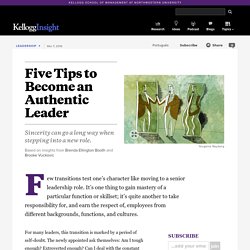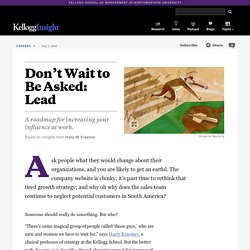

90 Ways to Quickly Improve Your Business Leadership. Editor's note: "The First 90 Days" is a series about how to make 2016 a year of breakout growth for your business.

Let us know how you're making the First 90 Days count by joining the conversation on social media with the hashtag #Inc90Days. Over the next 90 days, you can build not only your business but also your personal leadership beyond what you may have thought possible. Let this be the year you become the leader you want to be--in your business and in life. 1. How Do You Know Someone Has True Leadership Skills? Look for These 5 Signs. 8 Keys to Your Excellent Q&A Session. Having fun during the Q&A in Elko, Nevada Audience members are shocked when I say, “Never close your speech with the Q&A.”

If you have some of my courses or are a member of my Speak and Prosper Academy, you’ve learned that it’s okay to have a Q&A period, but that you shouldn’t make it last thing your audience members hear. 6 Ways Your Leadership Is Destroying Your Business. Do you remember playing the telephone game as a child?

You and your friends would sit in a line and one person would whisper a phrase to the person next to them. This would continue until it reached the final participant who would say the phrase out loud. Five Tips to Become an Authentic Leader. Few transitions test one’s character like moving to a senior leadership role.

It’s one thing to gain mastery of a particular function or skillset; it’s quite another to take responsibility for, and earn the respect of, employees from different backgrounds, functions, and cultures. For many leaders, this transition is marked by a period of self-doubt. The newly appointed ask themselves: Am I tough enough? Extroverted enough? Can I deal with the constant exposure? How To Be Your Own Leadership Development Coach. Today’s organizations have a leadership gap.

According to Deloitte’s "Global Human Capital Trends 2016" report, 89% of executives found the need to strengthen, reengineer, and improve organizational leadership. However, more than half (56%) said their organizations are not ready to meet leadership needs, and more than one in five companies (21%) have no leadership programs at all. For those who are willing to take the initiative to develop themselves as leaders, this gap represents an opportunity, says leadership coach Karen Lawson, founder of Lawson Consulting Group, Inc.. Developing oneself as a leader takes time and effort, but can position you for more opportunities, she says. Here are six essential components to put yourself on the track to become a more effective leader. Don’t Wait to Be Asked: Lead - A roadmap for increasing your influence at work. Ask people what they would change about their organizations, and you are likely to get an earful.

The company website is clunky; it’s past time to rethink that tired growth strategy; and why oh why does the sales team continue to neglect potential customers in South America? Someone should really do something. But who? “There’s some magical group of people called ‘those guys,’ who are men and women we have to wait for,” says Harry Kraemer, a clinical professor of strategy at the Kellogg School.
But the better path, he says, is to lose the shroud of magic around this group and simply become part of it. Want to Be a Good Boss? Start by Understanding Why You Want to Lead - Research explores the pros and cons of two distinct leadership styles. Kids on the playground and military generals both know that there are two ways to hold onto power.

You either dominate everyone and demand their support, or you get them to like you and offer up their fealty freely. Those two leadership styles—motivated by the desire for either dominance or prestige—are examined in research from Kellogg’s Jon Maner. Each one has pros and cons, and they work best under different circumstances.
“It’s not that one strategy is good and one strategy is bad,” Maner says. “They both can work in different kinds of organizations.” 10 Habits of Ultra-Likeable Leaders. Likeability isn’t a birthright—it results from acquirable skills that are crucial to your success.

Too many people succumb to the mistaken belief that being likeable comes from natural traits that belong only to a lucky few. In this article, originally published on LinkedIn Pulse, Dr. Travis Bradberry explains how being likeable is under your control, and it’s a matter of emotional intelligence (EQ). Leaders, You Can (And Must) Do Better. Here's How. Want to Be a Great Leader? Ask Yourself These Questions Weekly. Three Habits For Showing Leadership Even When You Aren't An Expert. Most meetings—whether the formal kind, with everyone seated a conference table, or the quicker, standing variety—don't encourage the type of collaboration they could.

Rather than a free exchange of ideas, meetings usually find everybody retreating into their areas of expertise—their mental cubicles. That makes a kind of sense. 15 Dos and Don'ts for Highly Engaging Leaders. Titles Don’t Make Leaders—But These 7 Actions Do. How to Fail at being a CEO & Leader. To Become a Leader, Think Beyond Your Role. The world is full of people with opinions.

Television, radio, and other media are brimming over with commentators making suggestions and offering seemingly authoritative advice to government officials and corporate executives about what they ought to do. At dinners and cocktail parties — and around the water cooler at work — we talk about what others should do or should have done, or the flaws of our bosses. In our jobs, we may give our opinion on an issue from a functional or departmental point of view — in other words, a limited perspective.
Or we may give an opinion without fully thinking about the issues and weighing the interests of various constituencies that our boss has to consider in order to make an important decision. You’ve Got to Serve Someone. Servant leadership is not a new concept. Robert Greenleaf introduced the idea back in 1977. In recent years, however, concrete evidence has emerged that the approach delivers more than warm, fuzzy feelings. Last month, the first quantitative study that begins to explain a connection between servant leadership and improved individual performance was published by researchers in Canada.
This new evidence may help move servant leadership from a niche practice to one adopted by more executives. Servant leadership goes against the model of the heroic individual who drives results through carrots, sticks, and at times, sheer force of will. The difference between a great leader and a good one. MPW Insider is an online community where the biggest names in business and beyond answer timely career and leadership questions. Today’s answer for: How do you build a strong team? Is written by Kerry Healey, president of Babson College. A variety of teams are necessary to operate a successful enterprise, but the first and most important team every leader must build is his or her own support system — a leadership team.
How To Be A Visionary Leader Without Being Arrogant. Leadership advice about finding your "vision" isn't too hard to come by. The thing is, most of it is pretty egocentric. Vision is too often understood as belonging to an individual leader, rather than something that can be shared by everyone. Nonprofit Know-how: Giving Feedback. Feedback is an effective, but underused, way to develop your people and achieve your mission. “When nonprofits use feedback regularly and effectively, they strengthen the work of the organization,” says Shera Clark, manager of CCL’s nonprofit sector. “Plus, you don’t need extra funding or a formal system to engage in giving feedback.” Clark is author of a new book in CCL’s Ideas Into Action series, Feedback That Works for Nonprofit Organizations. Secrets of the Superbosses. Are You a Leader or a Follower? Six Things Real Leaders Don't Do (Like Boss People Around)
Mentoring Future Leaders: Setting The Framework For Success Within An Organization! Where have all the leaders gone? Why Most Managers Are Failing Their Employees (Infographic) New research shows that frontline managers are rarely given the support needed to do their jobs to the best of their ability. Amazingly, only 12 percent of respondents to a recent survey said their organization invests sufficiently in the development of frontline managers.
The infographic below from Harvard Business School Publishing explains why many managers get low marks on leadership competencies. The Incredible Power of Not Taking Credit. How do you rate your team management skills? I met recently with a prospect, (who is thankfully now a client), who wanted to discuss issues that he was having with his team. He gave me chapter and verse about the team – their strengths and weakness, performance, length of time in role etc. This is all great information and really important when working with the team. However, I was missing some critical information – feedback on himself as a manager and a leader. I asked him to rate his team management skills, and after swallowing his initial shock at being asked such a question, he began to reflect upon this unexpected query.
To help him, I asked him a series of questions, which are an indicator of his skills, and he found the questions and the discussion so valuable that I thought I would share them here with you, so that you can answer these questions too! What Amazing Leaders Do Differently. Which Behaviors Must Leaders Avoid? - Amy Jen Su and Muriel Maignan Wilkins. By Amy Jen Su and Muriel Maignan Wilkins | 12:00 PM May 28, 2013 If you want to empower, engage, or motivate others, don’t just focus on increasing your positive behaviors. Seven Transformations of Leadership. How Poor Leaders Become Good Leaders - Jack Zenger and Joseph Folkman. 10 Barriers to Great Leadership. Becoming a Leader (Part 5) : Blog. Becoming a Leader (Part 4) : Blog. Becoming a Leader (Part 3) : Blog. Becoming a Leader (Part 2) : Blog. Becoming a Leader (Part 1) : Blog. Why Leaders Should Embrace Being Wrong.